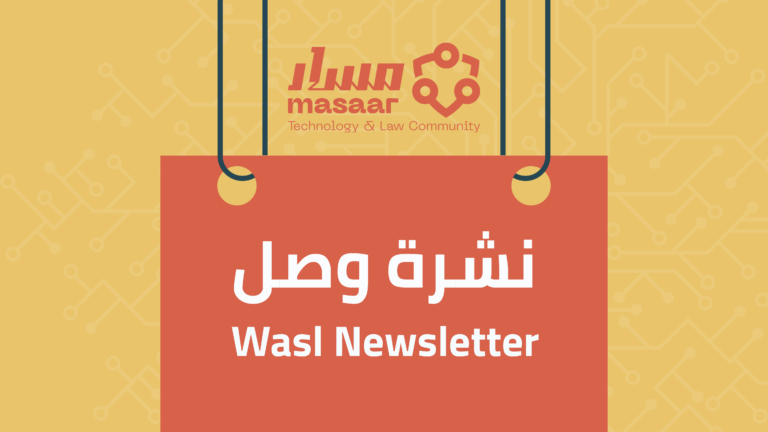
Masaar’s Activities

Tech and Law
Legislative Effect of not Applying the Controls of the Digital Forensic Evidence
Until not long ago, Egyptian legislation did not include a specific definition of electronic evidence. The Egyptian legislator introduced, for the first time, a definition of electronic evidence in the Anti-Cyber and Information Technology Crimes Law, and called it “Digital Evidence.” This paper deals with the definition of Digital Forensic Evidence and discusses the extent to which Public Prosecution and Economic Courts adhere to its controls and conditions, and the legislative effect of not applying those controls.
Link for the paper: In Arabic
Internet Governance
Internet Governance (2): Governance by Infrastructure
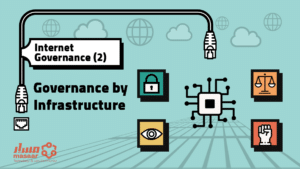
The second part of the “Internet Governance” series deals with governance by infrastructure. This paper covers governance by internet protocols, governance by the DNS, and how manipulating internet infrastructure affects users.
Link for the paper: In English | In Arabic
Internet Governance (3): Law and Internet Governance
Governments all over the world try incisively to impose their laws on Cyberspace events and activities. They assert their law-making authority over Cyberspace activities based on considering that these activities constitute entry into their physical jurisdiction. The third part of the “Internet Governance” series covers law and internet governance.
Link for the paper: In English | In Arabic
Privacy
Unwritten Rules: Impacts of the Delayed Executive Regulations of Data Protection Law on Sensitive Data
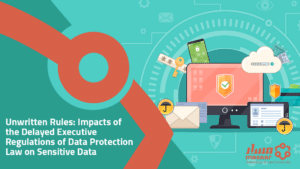
This paper covers the definition of sensitive personal data, its different classifications, and the obligations of service providers to protect it. The paper also deals with the consequences of unauthorized disclosure, collection, or storage of sensitive data, in addition to the impact of the expansion of the entities exempted from the Data Protection Law and the delay in issuing its executive regulations on sensitive data.
Link for the paper: In English | In Arabic
Tech and Equality
Cyberspace Sexism Against Women
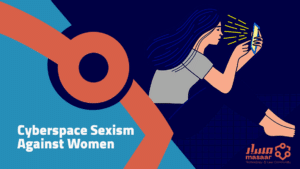
This paper discusses the question: Why has Cyberspace failed to be different from the wider societal space? Namely, why isn’t it less sexist and misogynist? The paper tries to explain that Cybersexism is not a mere direct reflection of societal sexism. Nor is it a remnant of a conservative era on its way to disappearing. Before anything, sexism is a social structure that has a crucial role in preserving the societal hierarchy. Its tools like the misogynist discourse are necessary weapons for defending the status quo.
Link for the paper: In English | In Arabic
Free Internet
Introduction to Combating Hate Speech
This paper seeks to offer an introduction to the different concepts related to hate speech, introducing as much balanced definition of hate speech as possible, through exploring the heated debate around if restrictions on the right of free expression can be justified on account of combating hate speech and if so, where and how to draw the limits of such restrictions.
Link for the paper: In English | In Arabic
Combating Hate Speech on the Internet
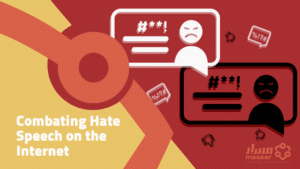
This paper seeks to provide enough information for forming a clear picture of the issues concerning hate speech on the Internet and combating it. It also seeks to offer pointers to an alternative approach to dealing with hate speech on the Internet in a way compatible with the balanced observance of human rights.
Link for the paper: In English | In Arabic
Digital Media
Fake News Verification Techniques and Initiatives
With the proliferation of fake news, it is imperative that we find a way of verifying news and information. However, before we even fact-check and verify such information, what is more critical is that we understand the various techniques used in spreading fake news and how to curb them. This two-part paper covers classifications of fake news, various fake news techniques, and suitable tools for fact-checking and verifying the news.
In English: Part I – Part II | In Arabic: Part I – Part II
The Human Rights-Based Approach for Digital Media

It is not simple to determine what type of regulatory response should be taken to digital media platforms like Facebook and Twitter, due to their dual function as public and private spheres. The ability of these companies to turn all kinds of human activity into highly valuable data and their control over widely used public resources has made them some of today’s richest companies. By approaching this challenge from a human rights perspective, we ensure that policies are consistent across borders and aligned with international norms.
Link for the paper: In English | In Arabic
Human Rights and Business
The Impact of Chinese Technologies on Human Rights
This paper seeks to offer enough information for painting a clear picture of the dangers posed by products and services offered by Chinese ICT companies on the fundamental rights of Egyptian citizens. It tries to explain the size of these dangers by offering information about how far these companies and products have penetrated and spread into the Egyptian market as well as describing the nature of these dangers by using examples that have been revealed about them in different parts of the world.
In English: Part I – Part II | In Arabic: Part I – Part II
Beyond the Algorithm: The Role of Facebook’s Oversight Board

This paper deals with the experiment of Facebook/Meta in establishing the Oversight Board to assume the role of the final arbiter in appealing the decisions taken by the company in its moderation of content on Facebook and Instagram. The paper presented the reasons that prompted Facebook to establish the Board, and its objectives for its establishment.
Link for the paper: In English | In Arabic
Human Rights Responsibilities of Tech Companies Operating in MENA
Governments within the MENA region have been increasingly purchasing and using powerful digital tools, including wiretapping tools, spyware tools, and facial recognition tools for mass surveillance. This paper contributes to unearthing and understanding the responsibilities that tech companies, which provide these tools, have in safeguarding rights and freedoms, particularly in the MENA region.
Link for the paper: In English | In Arabic
New on “CONNECT” Podcast (Arabic Audio)

- Episode (15) | Surveilling Minorities in China: How New Technologies Are Being Used to Abuse Uighurs’ Rights
Listen to the podcast on: Google Podcasts | Apple Podcasts | Anchor | Spotify
Press Statements
International Coalition of Rights Groups Call on Internet Infrastructure Providers to Avoid Content Policing
Most users use the internet without thinking about the underlying services. But those services are essential to online expression, privacy, and security. And when these service providers—many of which have little if any contact with users—intervene based on content, their choices can have huge impacts on human rights that may be difficult or impossible to redress.
Link for the statement: In English | In Arabic
Joint Statement: Iraqi authorities must cease their chilling crackdown on free speech
The signatory organizations express their deepest concern regarding the Iraqi authorities’ recent campaign to crack down on “indecent content” online. This crackdown has a chilling effect and will stifle free speech in the country. Iraqis should be free to express themselves on social media platforms, whether it is to make jokes or engage in satire, criticise or hold authorities accountable or discuss politics or religious topics. These are behaviours protected by international human rights law, which Iraqi authorities are obligated to uphold.
Link for the statement: In English | In Arabic
From the Arab Region
- Hashtag Palestine 2022: 7amleh restored a third of the deleted Palestinian content from social media platforms. This publication diagnoses the state of digital freedoms and outlines the most prominent patterns of digital rights violations and their trends during 2022.
Link for the publication: In English | In Arabic
- The Jordan Open Source Association (JOSA) emphasizes the right to access the Internet in Jordan, and asks for the removal of any obstacles standing in the way of communication following a series of internet blackouts and blocking TikTok in the country.
Link for the statement: In English | In Arabic
- SMEX published a report on the Central Inspection Platforms in Lebanon. The report raises a number of questions related to who oversees the Central Inspection’s processing of the data collected from citizens and residents, and how can third parties access it. SMEX demanded that the Lebanese government enacts a comprehensive privacy law that endorses best practices for data protection and privacy.
Link for the report: In English | In Arabic
